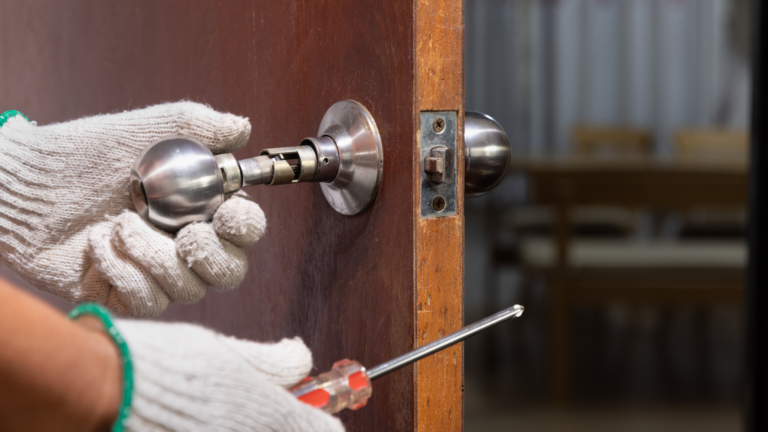While locks play a key role in home security, they can have issues that affect their effectiveness. Addressing these issues promptly is crucial for ongoing safety. In this section, we analyze typical lock issues, delivering comprehensive insights and additional solutions to keep your locks in top shape.
Sticky Locks That Are Hard to Rotate
Causes
The primary causes of malfunctioning locks include rust development, debris buildup, and worn-out internal parts. Dust and grime can build up inside the lock mechanism over time, making it less effective. Exposure to moisture in older locks or those constantly outdoors can result in rust. Moreover, frequent use can erode internal components, raising the probability of lock malfunctions.
Comprehensive Solutions
To ensure a thorough cleaning, disassemble the lock if you are comfortable doing so and clean the internal components with a gentle brush and an appropriate cleaner to remove built-up debris and old lubricant. Lubricate the locks on a regular basis and keep the surrounding region clean to avoid debris from entering and causing lock problems.
Misalignment in Lock Mechanisms and Striker Plates
Causes
Building doors and frames may move as a result of structural settling with age. Additionally, variations in the weather might cause materials to expand and contract, which could lead to doors and frames that are not aligned.
Comprehensive Solutions
When realigning a door, begin by using a screwdriver to tighten the hinges and adjusting shims as necessary. If the latch doesn’t align with the strike plate, remove it and reinstall it in the correct position, potentially using a chisel to create extra room. In addition, improving or changing the weather stripping can improve door alignment and guard against misalignment problems in the future, guaranteeing that the door works smoothly and fits snuggly in its frame.
Damaged Keys
Causes
Keys can lose integrity over time if they develop weak spots, particularly with frequent use or exposure to force. Furthermore, metal wear and tear from frequent use increases the risk of breaking.
Comprehensive Solutions
Start by carefully removing the broken piece of a key with a small jigsaw blade or a key extractor tool from the lock. It’s crucial to often examine keys for wear and make duplicates before they get worn out. Avoid using extensively worn keys to prevent breakage. If you’re unable to remove the broken key, consider seeking help from a locksmith; they possess specialized equipment to safely retrieve it.
Locks with Wobble or Looseness
Causes
Locks in high-traffic areas tend to become loose over time due to frequent use, which wears out their mechanisms. Furthermore, if locks are installed improperly, they may loosen over time due to inadequate initial fastening.
Comprehensive Solutions
Begin with removing the cover and tightening all visible screws to ensure the lock operates smoothly. Ensure the lock mechanism is securely installed in the door. Furthermore, if you observe any worn-out components, replacing the entire lock mechanism may be needed to sustain its effectiveness.
Need a locksmith? Don't Worry!
Our expert locksmiths are available 24/7. We're here to help with all your emergency lock needs. Don't hesitate, call us now!
Key Won’t Insert Fully
Causes
Items or debris from outside can block the keyway, disrupting the smooth operation of the lock. Also, a bent or damaged key might prevent full insertion, affecting the lock’s functionality. It’s essential to promptly address both issues to maintain smooth key operation and ensure lock security.
Comprehensive Solutions
To maintain your lock’s functionality, clear visible debris from the keyway with a thin, non-metallic tool. Afterwards, check the key for bends or damage and replace it with a new one if necessary to avoid future problems. Should the issue persist, consider reaching out to residential locksmiths in Abington, PA who can meticulously inspect and clean the lock’s internal components to ensure top-notch performance and security.
Lock is Frozen
Causes
If temperatures drop, moisture within a lock can freeze, potentially causing function issues. Locks exposed to severe weather conditions are more likely to freeze without adequate weatherproofing, which can affect their functionality. Adequate protection from the elements is important to prevent locks from freezing due to moisture buildup.
Comprehensive Solutions
Use a lock de-icer spray with alcohol or similar substances to swiftly thaw a frozen lock. Before the winter months arrive, lubricate the surface to keep moisture out and put a lock cover to protect it from inclement weather. Should the lock continue to be frozen, heat the key gently with warm water or a lighter before inserting it to melt the ice inside the lock.
Homeowners can keep their locks secure and dependable by promptly fixing common issues and knowing when to call a professional. Regular maintenance, periodic improvements, and appropriate care are necessary to keep your home’s locking systems reliable and intact.
If you’re experiencing problems with your home’s locks and haven’t found a solution, consider contacting residential locksmiths in Abington, PA for assistance. We use our expertise and specialized tools to handle a variety of lock-related difficulties, increasing property security and bringing peace of mind. Kindly call us as soon as possible!

